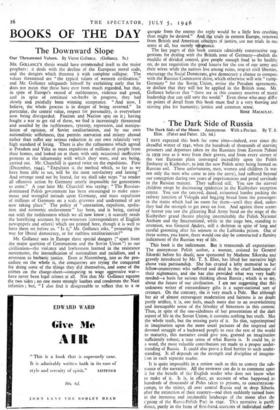BOOKS OF THE DAY
The Downward Slope
Our Threatened Values. By Victor Gollancz. (Gollancz. 5s.)
MR. GoLuutcz'S thesis would have commended itself to the major prophets : it deals with the decline of the European moral code, and the dangers which threaten it with complete collapse. The values threatened are " the typical values of western civilisation," and Mr. Gollancz safeguards himself by explaining early that he does not mean that these have ever been much regarded, but that, in spite of Europe's record of ruthlessness, violence and greed, and in spite of continual set-backs in progress, they had slowly and painfully been winning acceptance. " And now, I believe, the whole process is in danger of being reversed." In particular, the central value, respect for personality, is everywhere now being disregarded. Fascism and Nazism spat on it ; having fought a war to get rid of these, we find it increasingly threatened and assailed by the ruthlessness, tyranny, repression, and manipu- lation of opinion, of Soviet totalitarianism, and by our own nationalistic selfishness, that permits starvation and misery abroad rather than suffer any serious reduction in our own relatively very high standard of living. There is also the callousness which agreed at Potsdam and Yalta to mass expulsions of millions of people from their homes, and looked on at them with only occasional ineffective protests at the inhumanity with which they were, and are being, carried out. Mr. Churchill is quoted twice on the expulsions. First (December, 1944), " Expulsion is the method which, so far as we have been able to see, will be the most satisfactory and lasting." And revenge need not be feared, for we, shall take steps " to render all offensive action by Germany utterly impossible for generations to come." A year later Mr. Churchill was saying: "The Russian- dominated Polish government has been encouraged to make enor- mous and wrongful inroads upon Germany, and mass expulsions of millions of Germans on a scale grievous and undreamed of are now taking place." The policy of " annexation, expulsion, spolia- tion and economic enslavement " has been, and is being, carried out with the ruthlessness which we all now know • it scarcely needs the horrifying accounts by eye-witnesses (correspondents of English newspapers and others) which are printed here, though it is well to have them set before us. " Is it," Mr. Gollancz asks, " preparing the way for liberal democracy, or for ruthless totalitarianism?"
Mr. Gollancz sees in Europe three special dangers (" apart from the major question of Communism and the Soviet Union ") to our civilisation—the violence and lawlessness learned in the resistance movements, the intensification of nationalism and racialism, and a reversion to barbaric justice. Even at Nuremberg, just as the pro- cedure on the whole is, the conquerors are trying the conquered for doing some of the things they did themselves, and some of the crimes on the charge-sheet—conspiring to wage aggressive war— have never been legal crimes at all. Not that Mr. Gollane7 equates the two sides ; no one more strongly loathes and condemns the Nazi infamies ; but, " I also find it disagreeable to reflect that to a to
quoqde from the enemy the reply would be a little less crushing than might be desired." And the trials in eastern Europe, removed from British and American concepts of justice, are not trials in our sense at all, but merely vgingeance. The last pages of this book contain admirably constructive sug- gestions for dealing with the British. zone of Germany—abolish the muddle of divided control, give people enough food to be healthy on- do not requisition the good houses for the use of our army and their wives while the natives live among ruins, respect civil liberties, encourage the Social Democrats, give democracy a chance to compete with the Russian Communist drive, which otherwise will win " rump- Germany " for the Soviet Union, revise the Potsdam agreements, or declare that they will not be applied in the British zone. Mr. Gollancz believes that " there are in this country reserves of moral leadership that can still save the world." Even those who may differ on points of detail from this book must find it a very finaving and stirring plea for humanity,-` justice and common sense.
ROSE /VIACALTLAY.


























 Previous page
Previous page